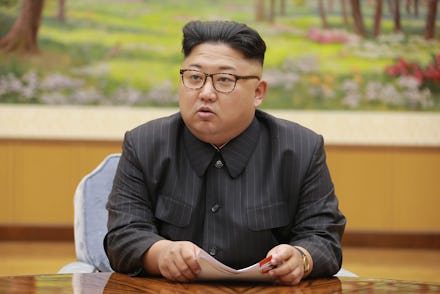Talks between North and South Korea could de-escalate nuclear tensions — and ice out the US

President Donald Trump on Thursday suggested that it was his aggressive rhetoric on North Korea that helped pressure the country into opening up communications with South Korea — a move he praised as a “good thing.” But the movement on talks within the Korean peninsula could ultimately box out Washington.
“With all of the failed ‘experts’ weighing in, does anybody really believe that talks and dialogue would be going on between North and South Korea right now if I wasn’t firm, strong and willing to commit our total ‘might’ against the North,” Trump tweeted.
The comment came the same day he and South Korean President Moon Jae In agreed over a phone call to suspend their joint military exercises during the Winter Olympics, which are set to begin Feb. 9 in Pyeongchang, South Korea — about 50 miles away from the demilitarized zone between North and South Korea.
The tweet also came as Trump continues to face criticism over a prior tweet from Tuesday in which he fired off against North Korean leader Kim Jong Un. Trump had bragged that his “nuclear button” is “bigger and more powerful” than Kim’s.
Kim, who has continued to threaten the United States since taking power, said in a New Year’s Day speech that he would be interested in opening up dialogue with South Korea regarding his country’s participation in the upcoming Olympic games. On Wednesday, he opened a line of communication with his neighbor that had been dormant for close to two years.
Tensions have been high between the North and South amid several high-profile nuclear tests by Pyongyang, including an intercontinental ballistic missile launch into the Sea of Japan in July. In reaction to this, South Korea announced it would look to build up its own arsenal of ballistic missiles.
While it’s just a start, the opening of communication has been welcomed by observers, who say that talks could lead to de-escalation of tensions on the peninsula.
“I think it’s a positive development,” Jenny Town, assistant director of the U.S.-Korea Institute at the John Hopkins School of Advanced International Studies, said in an interview Wednesday. “It could open the door to other discussions in the future.”
But some analysts also worry that in opening up communications with South Korea — without its ally, the U.S. — Pyongyang could ice out the U.S., which under Trump has succeeded in tightening sanctions on the country, but has failed to put forth a coherent strategy on dealing with the country’s nuclear program.
Gary Samore, an Obama-era coordinator for arms control and weapons of mass destruction, told Mic Wednesday that if Moon and Kim begin working toward a deal on North Korea’s nuclear weapons program, the Trump administration will have to develop a clear diplomatic strategy — or risk the two countries cutting a deal that the U.S. could find unfavorable.
“I don’t see any evidence that the Trump administration is thinking of such a plan,” Samore said. “I’m worried we’re going to get left behind.”
Moon, who was elected South Korea’s president in 2017, has been vocal about his desire to jumpstart dialogue with North Korea, though he has said he “cannot tolerate” its nuclear program. Samore expressed concern that Moon could “agree to a deal we don’t like” — possibly one similar to the freeze-for-freeze agreement Russia and China have backed.
Under such a deal, North Korea would “freeze” its nuclear program in exchange for the U.S. and South Korea halting their military exercises in the region.
But those concessions wouldn’t be equivalent, Samore said. A better deal would involve trading sanctions for North Korean concessions on its nuclear program.
The Trump camp, however, hasn’t shown yet that it has a diplomatic plan beyond the pressure it has already applied unilaterally and through the United Nations.
“I don’t think the Trump administration knows what they’re doing,” Samore said.
So far, the administration has put forth a disjointed response to the crisis on the peninsula. Secretary of State Rex Tillerson has stated that he wants a diplomatic solution, saying in December that he’d even be willing to sit down for negotiations “without precondition.”
But Trump has undercut such diplomatic overtures, at one point saying that he believed Tillerson was “wasting his time” trying for talks with the North Koreans.
According to Town, the administration’s mixed messages — and its unwillingness to back off its insistence that negotiations be predicated on North Korean disarmament — could mean the U.S. gets left out of possible diplomatic talks.
“The U.S. is icing the U.S. out of these discussions,” Town said. “The U.S. hasn’t wanted to negotiate with North Korea without high preconditions. ... North Korea isn’t going to change its behavior just to have a negotiation.”